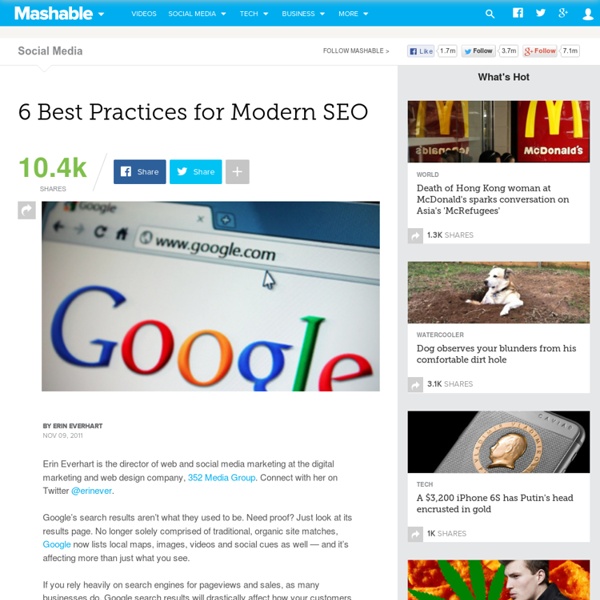6 Best Practices for Modern SEO

How Google's Semantic Search Will Change SEO
Erin Everhart is the director of web and social media marketing at 352 Media Group, a digital marketing agency that also provides web and mobile app development. Connect with her on Twitter @erinever. While the SEO game has changed drastically over the past months, one thing has remained fairly consistent: It’s been driven by keywords — keywords in your URL structure, your META tagging, your content, your links. Whatever way you slice it, keywords are everywhere in SEO. SEE ALSO: How Google’s Social Search Shift Will Impact Your Brand’s SEO Even among Google’s most recent algorithm updates — Panda, Search Plus Your World and Venice, to name a few — keywords remained relatively unscathed. What Is Semantic Search? Semantic search uses artificial intelligence in order to understand the searcher’s intent and the meaning of the query rather than parsing through keywords like a dictionary. Semantic search isn’t a new concept. The Knowledge Graph What Does It Mean for SEO? For example: Yoga.
How to Analyze Your SEO Competitors
Have you ever had the feeling that no matter what you do, you are not successful with search engines? While it is quite possible that you are doing things wrong, one other possible reason for your poor SEO performance is that your competition is really tough. If you are in a very competitive niche, then your competition can be really smashing and you just can't afford not to keep an eye on them. Well, even if your niche isn't that competitive, you will only win if you know how to monitor your competitors' success and failure. Here are some steps you can do to analyze your SEO competition. 1 Find Who Your SEO Competitors Are You can't analyze your competitors, if you don't know who they are. However, in other cases, identifying your competition isn't that easy. 2 Visit Your Competitors' Sites and Analyze Them After you have a list of your competitors – or at least the major ones – the next step is to visit their sites and analyze them. 3 Analyze The Keywords Your Competitors Use
How to Find Low Competition Keywords with Google Keyword Planner
Previously I have written about Bing Webmaster Advance SEO tools for Niche marketers, which helped many people to find profitable keywords in less than an hour. Now its time to discuss about the most talked Google Keyword Planner. Earlier Google Keyword Research Tool was the only free option to find low competition keywords in less time. But with Google’s recent announcement that their Keyword Research Tool has been replaced with Google Keyword Planner, many people lost hope in finding profitable niche keywords for free of cost. Though Keyword Planner is purely based on a commercial angle, you can still dig down to find potential keywords for your niche blogs or potential clients. The new Keyword Planner was built to support more PPC ads and advertisers, rather than any freelancer SEO’s or niche marketers. Though you might think Google was a bit harsh on professional SEO’s and Internet marketers, you still have to understand that they give much importance to their paid customers.
21 Best FREE SEO Tools for On-Page Optimization
Google's official position on webmaster best practices really hasn't changed much over the years. What has changed is the search engine's ability to enforce these guidelines through improved algorithms. The implementation of Panda, Penguin, and Hummingbird has had a profound impact on the SEO landscape. Google's Matt Cutts has remarked that no one should be surprised when a website that hasn't followed the guidelines is penalized. What Cutts overlooks or chooses to ignore is something that I have dubbed the "Google Paradox". I suspect the Google paradox is the root cause for one black hat forum member expressing his desire to "punch Matt Cutts in the face" (per Cutts' Pubcon 2013 keynote). In order to reach the top of the SERPs and stay there in 2013 and beyond, your website must deserve to be there. Keyword Research Developing the right list of keywords remains a staple of SEO, even in 2013. 1. 2. 3. 4. Übersuggest utilizes the "Suggest" data from Google and others. Content Tools 5. 6.
Related:
Related:



